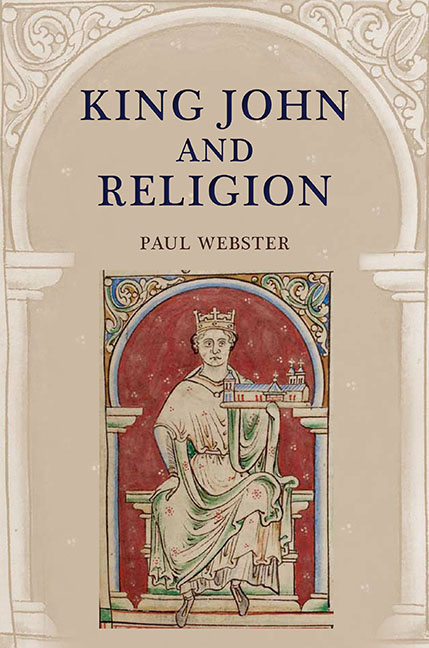Book contents
- Frontmatter
- Dedication
- Contents
- List of Illustrations
- Acknowledgements
- Abbreviations
- Introduction
- 1 The Mass
- 2 The Saints
- 3 Powerhouses of Prayer
- 4 Family
- 5 Charity and Almsgiving
- 6 Religion, Politics, and Reputation: The Interdict and King John’s Excommunication
- 7 Peace with the Pope: Diplomacy, Personal Religion, and Civil War
- 8 King John’s Deathbed and Beyond
- Conclusion
- Bibliography
- Index
- Other volumes in Studies in the History of Medieval Religion
- Frontmatter
- Dedication
- Contents
- List of Illustrations
- Acknowledgements
- Abbreviations
- Introduction
- 1 The Mass
- 2 The Saints
- 3 Powerhouses of Prayer
- 4 Family
- 5 Charity and Almsgiving
- 6 Religion, Politics, and Reputation: The Interdict and King John’s Excommunication
- 7 Peace with the Pope: Diplomacy, Personal Religion, and Civil War
- 8 King John’s Deathbed and Beyond
- Conclusion
- Bibliography
- Index
- Other volumes in Studies in the History of Medieval Religion
Summary
This is a study of the personal religion of one of England's most notorious kings: John. Its contribution lies within the developing study of the religious observance of England's medieval rulers. For various monarchs, in particular Henry III and Richard II, religion was central to their vision of kingship, whilst others – Henry I, Edward I, and Edward III – were generally successful kings who balanced personal religion as one of several aspects of rulership. An extended study of a king whose personal religion is rarely seen as important, indeed who has sometimes been condemned as irreligious, will illustrate the rich scope of the topic even for kings deemed to have failed as monarchs. This represents a further step towards an overall view of the theme for the post-Conquest kings of England, ‘a study that richly deserves to be written, but that as yet has failed to attract an author’.
It will be argued that despite King John's reputation, reflected by the chroniclers of his own day and developed by later writers within and since the medieval period, this was a king who recognised personal religion to be an important aspect of kingship. Throughout his active life on the political stage, John tried to engage with major elements of the religious observance of the elite of his day: attending religious services, maintaining chapels and chaplains, praying at the shrines of the saints, maintaining a collection of holy relics, endowing masses and prayers for himself and his kinsmen, founding and supporting religious houses, and feeding the poor. Were it not for his reputation for failure and misgovernment, he would rank alongside other medieval kings who recognised the importance of outwardly demonstrating their personal religion. This was a means of display. It emphasised the aura surrounding authority. Potentially – but ultimately harder to prove – it also provided for individual needs on a personal level.
In describing John's religious activity, the term ‘personal religion’ has generally been preferred to discussion of the king's ‘piety’. The latter term can be problematic, although it was used by medieval kings, including John, in the phrase divini pietatis intuitu, which appears regularly in documents issued to religious institutions. Piety can be defined as ‘reverence or obedience to God (or to the Gods); devotion to religious duties and observances; godliness, devoutness’. The origins of the term lie in medieval languages: Anglo-Norman and Middle French.
- Type
- Chapter
- Information
- King John and Religion , pp. 1 - 18Publisher: Boydell & BrewerPrint publication year: 2015

